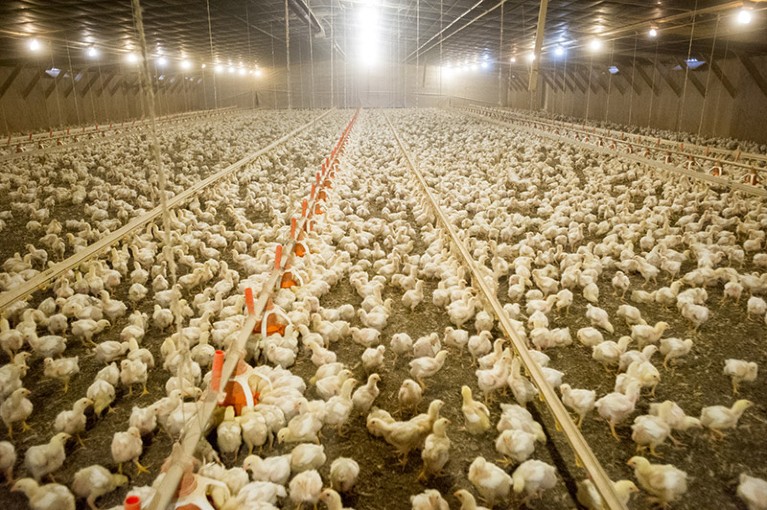[ad_1]
Hello Nature readers, would you like to get this Briefing in your inbox free every day? Sign up here

Researchers have struggled to calculate the amount of antibiotics used in agriculture in many countries.Credit: Edwin Remsberg/The Image Bank/Getty
The amount of antibiotics used in animal farming is underestimated in official reports. Researchers collated figures from sources such as farm surveys and drug sales, because “the majority of data on antibiotic use in the world is unusable”, according to epidemiologist Thomas Van Boeckel. Calculations of antibiotic usage in 229 countries suggest that Africa’s use is probably twice what the World Organization for Animal Health reports, and use in Asia is 50% higher than reported. Globally, antibiotics use in farmed animals is projected to grow 8% between 2020 and 2030. There are efforts to curtail agricultural antibiotics use, which could drive drug-resistant infections in humans.
Reference: PLoS Global Public Health paper
A team of environmental scientists has a plan to end a long-running dispute between Egypt, Ethiopia and Sudan over Africa’s largest hydroelectric dam. Since construction began in 2011, the countries have been trying and failing to resolve concerns including the speed of completing the project and the volume of water that will be released to drive the electricity-generating turbines. Researchers used climate models and artificial intelligence to create scenarios for how the dam could operate to maximize economic benefits while adapting to the effects of climate change. The plan offers “a win–win solution for these countries”, says civil-engineer Sharaf Eldin Bannaga.
Reference: Nature Communications paper
Some bacteria have a bizarre way of packaging chromosomes and regulating gene expression: they use proteins that weren’t thought to exist in bacteria at all. Researchers report that proteins called histones seem to coat regions of the bacterial chromosome in two species. This is a marked difference from histones’ function in eukaryotes (which includes animals, plants and fungi), in which the proteins form a spool for DNA to wind around. The researchers surveyed thousands of bacterial genomes and found histone-like proteins in about 2%. For now, it’s unclear what the histones might be doing, and how their unusual mode of action might help the bacteria to survive.
Reference: bioRxiv preprint (not peer-reviewed)
People seem to be more likely to excuse the negative effects of driving — such as pollution and accidents — than those in other areas of life. In a survey of 2,157 drivers and non-drivers in the United Kingdom, roughly half were asked to rate a statement about cars. The others were given an almost identical sentence about another issue. For example, 75% agreed that people shouldn’t smoke in highly populated areas where others have to breathe in the fumes — but only 17% agreed that people shouldn’t drive in highly populated areas. The researchers suggest that this ‘motonormativity’ inhibits our ability to think objectively about how we use cars.
Reference: psyArXiv preprint (not peer-reviewed)
Features & opinion
Barbara Rae-Venter, a former biologist and patent attorney, stumbled into an intense post-retirement hobby: using consumer DNA databases to solve mysteries. In 2018, she was key to identifying a serial murderer known as the Golden State Killer by connecting crime-scene DNA to genetic information that people had innocently uploaded to GEDmatch. In her new book I Know Who You Are, Rae-Venter tells of her involvement in that case and other gripping investigations. But the book disappoints when examining the ethical quandaries that ensnare the field, writes Nature features editor Brendan Maher in his review.
Acting out vivid dreams — for example by flailing, kicking or jumping out of bed — can be a harbinger of neurodegenerative diseases. REM sleep behaviour disorder (RBD), which occurs during the rapid eye movement (REM) sleep phase, seems to be linked to conditions in which the protein α-synuclein forms toxic clumps in the brain. Actor and science-communication advocate Alan Alda, who starred in the television series M*A*S*H, was diagnosed with Parkinson’s disease after reading about the link and noticing the symptom in himself. RBD is a useful early sign, and raises a tantalizing possibility for therapy: people with motor problems when awake can still move or shout when they are sleeping.
Scientific American | 13 min read
Global warming beyond the Paris agreement’s target of 1.5 °C above pre-industrial levels is often seen as spelling inevitable global disaster. Yet the figure doesn’t represent a planetary threshold or ecological tipping point, argue climate sociologists Béatrice Cointe and Hélène Guillemot in a history of the iconic target. It emerged from decades of diplomatic negotiations, and remains a powerful tool to spur governments, industries and individuals into action. The target seems to be increasingly unreachable, but framing it as a point of no return can lead to paralysis and apathy, notes environmental writer Emma Marris.
Reference: WIREs Climate Change paper
On Friday, Leif Penguinson was hiding among the beech trees in Sălicea, Romania. Did you find the penguin? When you’re ready, here’s the answer.
Today, I’m feasting my ears on singing ice, beatboxing whales and other underwater sounds recorded in the polar regions. Send your best crabeater-seal impressions, alongside any feedback, to briefing@nature.com.
Thanks for reading,
Katrina Krämer, associate editor, Nature Briefing
With contributions by Flora Graham and Smriti Mallapaty
We’ve recently launched two new e-mails you might like. They’re free, and of course you can unsubscribe at any time.
• Nature Briefing: Cancer — a new weekly newsletter written with cancer researchers in mind. Sign up here to receive the next one.
• Nature Briefing: Translational Research covers biotechnology, drug discovery and pharma. Sign up here to get it free in your inbox each week.
[ad_2]
Source link

